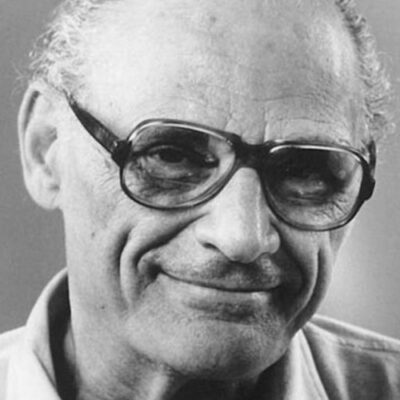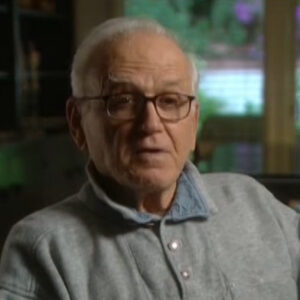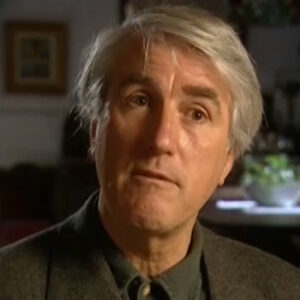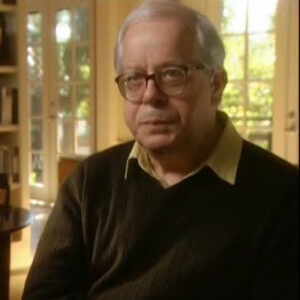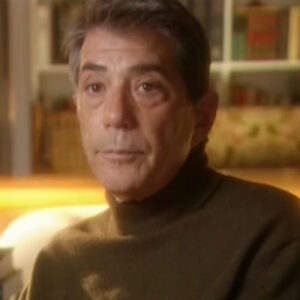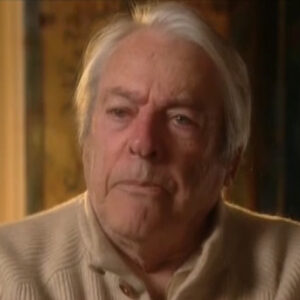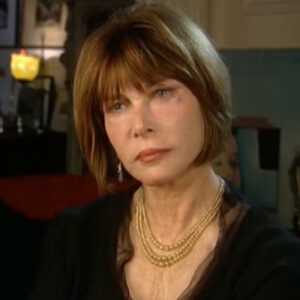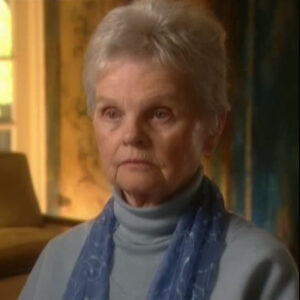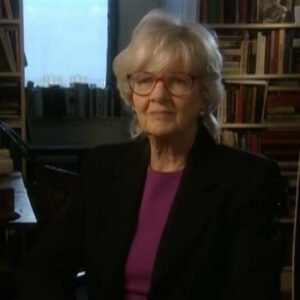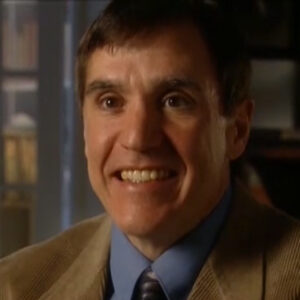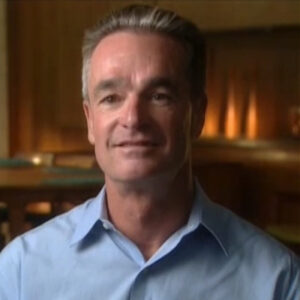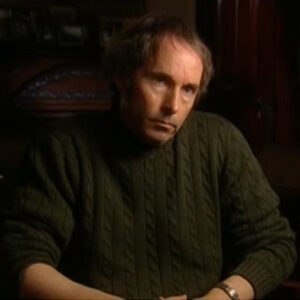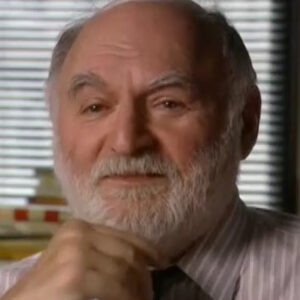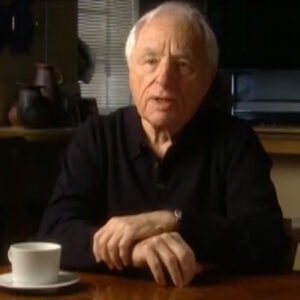Speaker We are finally I know Barack us, they were sent over to ask you to start with you remember the first time you met Arthur Miller going on like yesterday? What was it like? Where were you? What was. What did he say? What did Ian. Abraham Lincoln might start again. Because I was talking. Go.
Speaker I was in my office and ground floor office on Henry Street, which was my law. Not net law. Right. Which was my political office.
Speaker I was running for Congress, as well as the so so-called headquarters of the longshore rank and file movement, of which I was the good spokesman for. It happened that the guys looked to me to speak for them. The role that Pete Panta played before and in this office, little office which had an iron gate. And the gate opens in this, Abraham Lincoln is standing in the doorway.
Speaker And he’s languor no shirt. You know, a lumberjack shirt. Regnum brown, so vivid, Nazeem. And a search there. Jim long gowns. What can I do for you? When do something. I said, Why? He said, Well, I’m not the Miller and. But. Audrey Miller, Arthur Miller. I just finished reading your book, Focus. How wonderful. Come on. And that was the first moment that Arthur and I met and in a sense, bonded.
Speaker What was our what were you doing and what? Why did it interest Arthur Miller so much?
Speaker Under the bridge, the docks of Brooklyn. Was being played out in enormous social gadgety. The longshoreman, most of whom in that area of the docks were Italians from southern Italy. Would come the United States escape poverty? And being pleasantest took the most menial jobs to load the ships. Feudalism that existed in Italy at that time when they came here, as my father did in nineteen hundred and seven. Feudalism with a little absolu land owners, and they would hire guys in the morning, get down to Village Square and you got hired for the day and at sunset you went back home. Never had a job, that same feudal tradition. Was transported to the docks of Brooklyn, where Patrone, the Lords was the mob.
Speaker The Unholy Trinity. Of the mob. I hate to say it. The church.
Speaker And Tammany Hall, the Democratic Party, they ran the docks. OK. Grant talks, music extracted millions of dollars, millions of dollars and political power.
Speaker So what’s life like for a guy Arthur Miller’s down in the docks? Place Miller down there for me. What’s he seeing when he walks around the docks?
Speaker The ships are just at the end of the street. Physically has Union Street, President Street at the foot of each treat of this village, if you call it South Brooklyn, adjacent to Red Hook. These ships. And they’re being loaded. Boom, boom, boom, boom, boom. OK. That’s Duc’s interesting noise. But we know he knows that the story and the noises begin long before eight o’clock, six o’clock in the morning, the shape up.
Speaker What’s Arthur Miller say? Give me the.
Speaker Seas five.
Speaker I don’t know who he is. Yeah. I got to know. My question is not going to be.
Speaker Who is it? What does Arthur Miller say? There’s hundreds of guys on Colombia’s street walking this way and that way.
Speaker Cold is maybe snow on and some guys are trying to get a cup of coffee someplace. And and what he he is is an O. Which ship is hiring, right? What can I get a job? Who’s going to go, do you think, Tony?
Speaker Give me a job here. I know those guys want gig back to back. Well, they’re not taken. God wants the job. The guys milling around looking for work. Six o’clock in the morning in the street.
Speaker How do you tell somebody you’re going to give them a kickback? You say you walk up and say what?
Speaker The point, isn’t it? Yeah, it is. Physically, what happens is the ship foreman has to hire 100 longshoremen to unload that ship.
Speaker But he wants to be paid for it. And then the mob insist that you pay the two bucks a day. Earn eight bucks a day. But you got to pay back, too. So they do what they call the shape up. The guys line up and the boss looks at him as his age.
Speaker And if you ready to pay the two bucks a tip your hat and you go, OK, go neck, got to go. And they pick out the crews that they need. The other guys, three out of five got. They got up at 5:00 to come and stand in the rain and snow, hoping to get the job even if they had to get back, willing to do it. But there’s no job back home if they could get a day’s work a week, two days a week. They could get by the family. This is what a stranger would see if I took him by the hand and said, come with me. I want to show you what it is to be a long shot. So that’s what you do at this this time. Don’t forget back Arthur Miller, who backed Arthur Miller when Artie said. What can I do for you? Say cheese. I come see right about this tragedy. These guys have been fighting to overthrow, but they’re only the mobsters. There’s bars. They got a gun fight on one of the people. And the one guy that emerged just before the war, 238, ignited this young Pete battery, beautiful Pete, 26, 27 years old, who had the guts to stand up and actually curse the pepperoni and begin to organize the workers and the workers who followed him, who were willing to risk their lives in support of this young guy who was leading them.
Speaker So where does this shop in Arthur Miller’s work? What is he? Right. Right.
Speaker To begin with, he wrote the story of this beautiful Pete Pacto, who was murdered by the mob for his refusal to go along with them. He wrote a story called The Hook. How did he come to write the story?
Speaker Already, I said, make a movie people wonderful.
Speaker You said that to her? Yes. Tell me again, you turn to already and say, why make a movie?
Speaker And especially since he and this fabulous director, Elia Kazan. Had already done All My Sons and all that Kazam was famous as a movie director as well as a stage director. That’s it. It was called Gadge Gatch because you make them movie. And that’s out of this waterfront tragedy Come emerged a screenplay called the book Kazan adored it. We’re going to play. We’ve got a movie. We’ve got a movie.
Speaker Did that movie ring true for you when you read it? Did it? Let’s talk for a second. So, Michael, can you. OK. They did it. Did it work? Was it was it a compelling and accurate portrait of the waterfront? You’re talking about the movie The Kazami and now talking about Arthur.
Speaker No. No, but they did make the beat. The screenplay read. Yes. Was a scrap was as a the truth about what if the men struggle, the courage, the courage of the workers to support.
Speaker I’m sorry I interrupted you. What was this? What are you talking about?
Speaker You talking about this, this. The hope is a story about a leader. Who in real life was P Pando? Who is murdered? And this story is a struggle of the workers to defeat the injustice, the mob.
Speaker This, in essence, was what Miller Hooke portrayed. Oh.
Speaker You ask me what, what, what, what other things did he write out of his?
Speaker I don’t know. Hold up because I’m going to get to those things and go on, because the first thing I did in the short story that we’re not going to order is the whole. Yeah. Does the hook when you read it. Didn’t know for you?
Speaker No author told me the story. You never read it? No, you told me a story telling a story. And we we spent weeks. Visiting Mook’s locations, talking to workers, getting onto the ships with Kisan. And. What we’ll do the story. I know what the story is going to be because Arthur and I talk about good think this was the work that was going to, in a historical sense, tell the truth about what happened to beat Bando and the waterfront workers and their courage in supporting, you know, the picture that you’re painting of Arthur Miller.
Speaker And at this point of Kazan as well. Yeah. Giving both men up there do. Are people with a great sense of purpose. Almost on a mission. Is that you think, fair to say.
Speaker Certainly milit. As his life has proven in so many wonderful things he’s done for social justice and as well.
Speaker Miller Young Miller time, 30 years old. A one year old was moved by social consciousness that came his social consciousness. This injustice, which, by the way. Coincidence. He lived on the waterfront. He lived in the chic part of Brooklyn Heights. But this tragedy was being unfolded just outside his window. It could not be unconscious of it, but it being a politically conscious guy, social justice guy. And then, above all, being an artist, someone who was great trauma artists and his traumas being performed right there. And he had to be murdered by the mob. She’s still being played out. My God, what are we seeing in another crucifixion? The mob. But drama. Drama.
Speaker What do I want to ask you? I forgot to tell you. You know what? People describe Miller, especially back then. They talk about a guy at. Lincolnesque, physically, what is Noah look like at this point?
Speaker Was he above all, he had an Adam’s apple? Hello?
Speaker Well, he had a long neck with the latter example. And there’s a lumberjack shirt and this magnificent Lincolnesque face. What are you going to do? That’s Arbi Stern looking. By the way.
Speaker People think of him and many people think of him as a kind of cold ish inner man. He is the funniest, funniest man I ever was with seven, so I would talk to Arthur is a comedian of the first order.
Speaker But people don’t know that. I don’t know Robert. He shows that in his in his, too. It is played. The price is, you know, he does it.
Speaker You know, he’s so smart that he comes off as cold. Did you find him more?
Speaker Well, when I would tell a funny story, we did a trip didley together. I remember one time I did zip. Was it because the ship was rolling? I told a story, literally fell out of bed from Bluffton and.
Speaker He’s very warm, very expressive, very, very expressive. Strange. That is outdrive for the rest of the world. It seems so difficult to penetrate. But I repeat, he’s a very funny guy.
Speaker That’s perfect. OK, so this is 1951, right?
Speaker Our relationship. Our relationship was spread over a period cap. When we first met is when I was running for Congress with his spokesman, the rank and file and all that as a Republican. Match liberal Republicans. And Milich came to help there.
Speaker Now, in the as time passed, we became intimate. He became intimate with the fight of the longshoreman to remedy conditions. He became intimate in a sense. We would come to the meetings and we would have strategy meetings in my office. He would, in a sense, put himself capitalism in a dangerous position. And the guys on the waterfront, my tenants, if you want to call him dad, the guy’s my right arm. I ran on my braceros. Oh, they did? No author was an artist, a Broadway personality, which he already was, because all my sons became the great hit. Won the Pulitzer Prize and all that.
Speaker Death of a Salesman. Sorry. Death of a Salesman. No, no, no. First, all my sons did not want to keep up the price.
Speaker No hurricane with the winter price. But it was a great hit and made Miller an international figure in a theater where the men didn’t know.
Speaker My men didn’t know from that. All they know Slim were called Artie called Slim, and his involvement with these guys became fashionable. Now they knew the guys knew that daddy was like one of my right hand guys. He was with me. And their daddy was raising money.
Speaker For us, and we knew that he was important. OK. May I ask you another question? Go ahead, Kenny.
Speaker OK. Last question on this tape.
Speaker You’ve done a great job of painting a very compelling real portrait of Arthur Miller.
Speaker But interestingly, that you’re one of the few guys that’s also going around the docks with Gatch with his arm. Yeah. You’re seeing them together. Yeah. Two questions. Yeah. The first is, what’s Kazam like? Is he quiet and reserved?
Speaker Oh, God. He’s more like me. I’m an Italian. I know. Italian background. Dad, you said maybe your mother taught Greek Turks and.
Speaker But he’s a passionate, outgoing guy. He’s not these Dems and those nightime, but they’re very earthy, passionate. Jesus. Oh, my. Whereas millions more Starkel required. And, oh, about Mila’s historicism part about the guys and I say the intimacy that arose between men and people, Mary lived upstairs and she was 16 years old. And she had a crush on me.
Speaker And I. You must promise to come to my 16th birthday next week. And she said, bring Slim. And we went to her birthday party and there was nobody there. Just Mary, a friend, Catherine, a kitchen table with a little cake. The father and mother gone into the other room beyond the beaded curtains and we sat and had a birthday party. And Catherine said, Slim. Are you a longshoreman to. He said no. And she said, what do you do? He said, I’m a truck driver.
Speaker And she said, Jeez, you got brains. We were so close so we could be invited to a birthday party another time.
Speaker The guys decide when to stop because I don’t want to run out. Yeah. Yeah. But we going to run it. Oh, yeah. OK. I want to ask you, here is the. Miller and Kisan, do they seem close?
Speaker Yeah, yeah. Miller Kosan, an identity like Damon and Pythias, I mean, just my buddies like he and I were close. Yeah, but these two guys, Damon and Pythias. Yes. Like brother to me. Yeah, brother.
Speaker We should change.
Speaker OK. OK. You are not OK.
Speaker Is he quiet? Is he reserved? No. No. Outgoing, fidgety. Hey, Jimmy. Yeah. Great. Good. Damn it is gone. Go. Let’s go. Right. Who are we talking about?
Speaker Kazam, that’s how he would talk. I record. Pretty girl go buzzing.
Speaker Oh. You know, we can do this picture, the mob, you know, gonna be good, eh?
Speaker You know what I mean?
Speaker Arthur, of course, say they were doing and heroic thing, maybe not heroic, but a brave thing to go and show the picture.
Speaker And Red Hook, Brooklyn, the DAX.
Speaker Indicting the mafia and accusing them struck the word mafia mob, the mob of of killing B panto, that these guys are agents of the ship owners and so on. You guys, a great catch.
Speaker You know what you have.
Speaker And these were brave men who not only had a social conscience and not only gave money like a lot of good guys didn’t like Tennessee, gave 500 bucks Oprey, got Tennessee to contribute 500 bucks and you couldn’t get dynamiter. Tennessee bailed them out right away. These brave guys who put her nonalignment didn’t get hurt.
Speaker So Gadg, in essence, got. Was it a brave man together with his brother, Arthur Miller?
Speaker Will point to a memorable picture. They were Revelator revolutionize. Those move the movie were what they were going to use. No actors, no. No Marlon Brando, they wanted me to play the role that. O eventually played. That was the revolutionary part of it.
Speaker These were brave men and they were going to revolutionize and let me out forgetting that it’s going to come, OK? It’s going to keep talking.
Speaker They weren’t just going to revolutionize movies. They were going to revolutionize the Brooklyn water.
Speaker No question, no question, no question was that they were going to route revolutionize if they could make the whole world see what was going on. They would change the political culture of New York because Tammany Hall, the Democratic Party, and they had to run the tax most important industry at that time in New York. That and the comic business. But the tax power of the tax. Right.
Speaker OK, so Arthur Miller, New York is out there like brothers. Yes. They’re so close.
Speaker Yes. And they decide to go on a mission.
Speaker We’re going to I am going to move for a year now that the film gets killed in Hollywood. Yeah. Kazan gets called to testify before the House.
Speaker You’ve made clear why the film dies because the government wants the changes to be made in the film. And Phil Miller tells them no changes.
Speaker Right.
Speaker What changes to do the government ask the government who wanted to do a very simple thing. The heroes, these workers who are supporting this liberal thing. One was Pete Panta, who died, and then the whole rank and file movement to fight the mob that they will not. Good guys. But they were the bad guys and the bad the make. The bad guys. The good guys.
Speaker I mean. I mean, you have to make that clear up. I want to go ahead because the idea is called to testify. Yeah.
Speaker He is worried because he was a member of the Communist Party.
Speaker So they say. Yeah. So you say you’re not a big secret.
Speaker Yeah.
Speaker Was there any doubt you think in your mind, in Miller’s mind, people who knew Gadge what he was going to do? What was your expectation?
Speaker Once he decided to go and testify as a friendly witness.
Speaker I’m not there yet. I’m at the beginning. You heard the guards get subpoena. What’s the expectation?
Speaker Bad things are going to happen. Bad things for. For justice.
Speaker Why you think heads will roll right away? The expectation is he’s going to be when?
Speaker Hollywood and the government insisted that Miller’s script be turned into a lie. And Miller refused to do that. And Kazan was willing to do the lie as he was going to be paid for at that moment.
Speaker I would not have been surprised that any evil thing.
Speaker Got it. Might have done.
Speaker Do you think when Gadg testifies as a friendly witness? Did Arthur talk to you about it at all?
Speaker Yes, from time to time. Yes, yes. What did Arthur say? I don’t remember clearly. In essence, what Arthur said was Piers. He couldn’t speak about it. He did. We didn’t discuss it. He was just silent subject.
Speaker The interesting that was that nobody’s going to have my question. Yes. They’re not going to know what you’re talking about.
Speaker What? What hurt Arthur so much?
Speaker He tells us the tales of his pain himself. He tells it in his book about his life, time bends. He puts it so.
Speaker Clearly.
Speaker Transitive losing a brother to an evil force.
Speaker When I step presenting only cause my questions are going to be on Miller’s part.
Speaker When Kisan name costumes. It was visible in his face, in his.
Speaker In this state, what was there to talk about and what Gabs did? Yeah. Yeah, I know what artists think and he knows what I’m thinking. There’s no need to say, gee, wasn’t that terrible thing about my bedroom. It’s.
Speaker It’s like looking down at the coffin and seeing your brother.
Speaker It is in some ways, if we think about the story that I’m telling.
Speaker Does it strike you as tragic in any way, the friendship between these two men?
Speaker Tremendous tragedy. Two good men. And they come across this terrible force, this evil thing. It will crush them. And one guy has the strength to say. No. A few you like Pete Patu did. And the other guy says to me and gives in. To watch a good man as Goudge is was.
Speaker What’s incredible is.
Speaker Sad, tragic to watch a brother, your brother. You can’t help him, he’s got to do it himself.
Speaker Gadge couldn’t face the force.
Speaker He had to. Do what he did. Tragedy.
Speaker Sounds like a Greek tragedy.
Speaker You know, these two brothers, Greek tragedy and not one of them should have been a Greek. Looks funny. The irony here.
Speaker Yeah, sad, miserable Miller takes.
Speaker One day it came out that said out of him, what am I going to do? This guy is going to kill his young man because he’s in love with his his niece. And I tell authored a story of tragedy. This wonderful oak of a man. A car bomb in a wonderful car. One of the heroism attacks one of my guys went. And he’s going to kill Felipe because Felipe is in love with his dad and he’s only doing it for illegal reasons to justify it. Get immigration papers. And that’s the only reason.
Speaker Maybe he loves the guy. You know what I mean? He can love the guy. What do you make of the cop? Cause he.
Speaker Oh, wait a minute. What I mean is he’s engaged in those days. We use words like Kuwait, how do you know? Kósa.
Speaker You said you heard as well as he’s talking about this very calm down, but as he’s talking, I realized that he’s in love with his own niece, who in real life was his flesh and blood niece. And that something is happening to my beautiful. Just. Oh, come on, man. And I say, you can’t do this, you killed your family, destroyed, and the country can notice why. I’m here to talk to you, Mr. Logi. I said, you can’t do this to him any day now. Somebody is going to head for. Somebody’s got to turn a guy. And sooner or later, he’s off your hands. As I said, if I could have bit my tongue. Because I realized that days, huh? That’s what I’m gonna do. And sure enough, of course, I don’t know. But the next day, the guy was picked up by the FBI. The daughter, the niece, his niece somehow came to know that Eddie informed where she screams. Right. Right. And make a long story short. Is he in our neighborhood, the worst crime is not to kill a man, sometimes there’s reasons why that’s not the worst thing. But to go and enforce one is the worst thing you could do. And this guy are phone to the FBI about a young man.
Speaker So he’s his life, his reputation, his name is destroyed.
Speaker In real life, the guy disappeared.
Speaker I don’t know what the hell to do at the dump. Talk now, Artie Hardy. What an opera. And out of that came a view from the bridge. Almost exactly as you tell it, almost, except for one thing at the end, Derek Bone, instead of running away. Commit suicide by saying to the brother of his victim, come out, fight. Go ahead. Let’s fight with the hooks.
Speaker And he allows his opponent. To kill him.
Speaker And he is to say anything, I read it when we’re talking about that, because the tragedy, the similarity between Eddie Cambourne and Gads Eddie Eddie Carbon was wonderful. Man Guides is a wonderful artist and a guy with principles in his head that he he might have done the wrong thing at one point. As we all know, and he’s that explains it as best he can. The fact is, it’s tragic to see Eddie Karbo and his own government fall. And gads, this oak of an artist meant for talking about Greek tragedies. Mamma mia. That’s a.
Speaker Normally, I would agree should it’s a great mix. That’s that’s America. Sorry.
Speaker So it’s about to pardon my Lord on the movie, on the water. Yeah, I was going to go back to that. You’re on the waterfront.
Speaker Did you see the movie? And it did it did it seem some somehow familiar to you?
Speaker Oh, boy. Oh, boy. The first time I saw the movie. I was at a special performance. Because I had written to play instead of its mouth is Hook. I wrote my own play about panto.
Speaker And a pepé was produced and reason beaten on its way to Broadway. Produced by Anna Stain’s in Town Foresight. And we know that Kazan’s movie On the Waterfront is gonna come out next week. For weeks, we’re bound for Broadway. We’re going to open 90 days from now. And he would go to the special screening and I watch.
Speaker This fabulous movie. Take me acting fabulous.
Speaker And with each word you stab into my heart, the cause aid is stealing my whole subject. My play won’t be able to open because it’s such a fantastic movie. But almost as painful that it was a lie. It was a distortion. It was a criminal distortion of the facts of the waterfront. A a hero, Pete, at all. It was a punch drunk, brash fighter, vertigo and not good a at the time that tried to make the hero of the waterfront is punch drunk and making the masses of the men who were the real heroes, who have been fighting for years to fight this in the making of them. Nothing.
Speaker A bunch of sheep.
Speaker Where do you think you get the idea for On the Waterfront?
Speaker Well, there’s a great Greek Greek word called out Paolo G.R..
Speaker But where does the idea of going to the waterfront come in?
Speaker Why do you want? Why did you make the waterfront? Why? How where do you get the idea from the movie? Yeah.
Speaker I started with with offered me to do a movie about the waterfront call. Look. And we went over it, right?
Speaker No, I know, but I’m sorry. No, it’s OK. All right. How does it come up with you?
Speaker How did you come up with the idea? Because Arthur Miller asked him to join Arthur Miller in making a movie about this. Fabulous.
Speaker Here’s what I want to know. Do you think that On the Waterfront has any connection to the Hulk?
Speaker What came out of the hole? They took all the physical apparatus of the hook and turned it in a perversion of what the look stood for. He took every scene. They took the streets. He took the doxie to the many did. He took. The apparatus. And turns it into and turned it into a lie. How specifically does he turn it into a lie?
Speaker I think you’ve done that a couple of times, but what I want to make sure I get is the fact that the look, the feel.
Speaker So much of it is born a couple of years earlier by walking around the docks with Arthur Miller.
Speaker Yes. Because the fact that in making the hook in writing the screenplay, they had to work together. So they spent days and weeks visiting peers and talking to the dock guys and creating. It’s not easy to create a movie script. Oh, I’m trying to do it now. It’s. So it’s hard to say they spent time week. And so when the hook went down the drain. Crisan took all of that, which he had learned from this thing and made a movie called On the Waterfront. Of which the essence of the water from the water was nothing but an apology for an informal.
Speaker I’m going to shift now to Arthur. Getting ready to testify.
Speaker Did Arthur talk with you? You’re an attorney. Yes. Did he talk with you at all about being called before you act?
Speaker No, only only vaguely. He had better lawyers, you know.
Speaker So what’s your sense? You hear that Arthur is being called to testify.
Speaker First of all, why? Why?
Speaker Curse in that era of red baiting McCarthyism. It was in Portland for the committee to destroy this icon. Miller was emerging. Young as he was an American, intelligent intellect, soci liberal society, the literary world, the liberal emerging.
Speaker Kind of a young Victor Hugo.
Speaker He was not only a great writer. But his staff says, oh, Kurds, in speaking out on social projects, made him an important man of the left.
Speaker OK, but then why not subpoena him in fifty one or fifty three when the crucible comes out? Why wait three years after The Crucible before he gets subpoenaed? What a change his life.
Speaker The only great change that I can think of that came in. To his life, was that gorgeous? Wonderful, Marilyn.
Speaker But that was done. Oh, right. You know, that they’d be the guys on it committed.
Speaker You like the un-American committee while a bunch of whores and Stella let them sue me for the slander level that they.
Speaker They would love to have Marilyn Monroe committed at courtroom.
Speaker Oh, that’s why he did it.
Speaker I know, I know. Arthur told me, I believe him. That did the worst day on a committee. I know. Bill Daley was, say, Chairman Walters.
Speaker She did, Chairman Walters. Yeah, you said Kate.
Speaker Can you get me Marilyn Monroe’s signature autograph?
Speaker Imagine Noontide is the head of a committee who trying to crucify Miller. It Davis the obvious that, of course, the power of Marilyn at that time was tremendous.
Speaker But we’re getting off on another subject that I want to.
Speaker I don’t think so. I mean, I think because what’s important is that I think you said a committee were whores and they do go to Arthur and they say, look, we’ll cancel this if you let us take our picture with Marilyn. And that’s important to me because what does it say to you about Hugh at.
Speaker And how much is Arthur MC matter at all to you? If if they’re more concerned about having your picture taken with Marilyn, we’ve got to change matters change, Kate. OK. All right, let’s take guys.
Speaker OK. Yeah. Mary Miller, what?
Speaker Yeah. Mary. My beautiful Irish Mary Slattery mill that. She’s a wonderful person and there was great love between Arthur and Mary, mother. I feel in my bones, I mean, we were all close and.
Speaker What happened? Did the gods can tell? But Mary was intelligent, witty. Loving your bath. There was certainly loving of how we all lived together at a point at weekends and so on, and the house, the little things that you can’t put into words and everything’s fine.
Speaker OK. Now we’re back to Greek tragedies.
Speaker The night that a view from the bridge.
Speaker That story is 10 that happened to me and it opened very dramatic. I can’t see myself on the stage. Somebody’s gone. And.
Speaker But more dramatic than anything.
Speaker Marilyn Monroe is in the audience. So we are.
Speaker And before curtain comes up.
Speaker For some reason, Arthur came up to me. Random. I’ll need a bite. And he said, Jim. Jim.
Speaker The kids are all right. Everything’s all right. That’s only certain. It was only later.
Speaker That I realize, is that the vague rumors about Marilyn Miller were true.
Speaker Shortly after that, it came public that Arthur. And Mary was split.
Speaker And there is euro, the Greek tragedy.
Speaker And he has now begins his romance in public with Marilyn. And he gets called before Hirak, I think, because of that. So maybe he pays a price in terms of tragedy. For that, I mean, certainly I think that’s some of how we see make that clearer. Well, without Marilyn Monroe, I doubt Arthur Miller ever would have been called before you at that trial. Never would have happened.
Speaker So you mean by marrying Marilyn, he showed more of his courage?
Speaker Well, I think by Marilyn Marilyn, he got into a little bit of trouble that he anticipated he would know. He didn’t anticipate that. I don’t think so. No. No. Go to.
Speaker Let’s stop for just a second, Elizabeth, where do we want to go to the States? OK, Jim. 1964. The view from the bridge has come out. It’s past. Arthur and Maryland have gotten married and divorced. And she’s tragically committed suicide. So. Miller announces to the world that he’s going to work again with EYLEA because the.
Speaker How did the people in your world respond to Miller working again with Kazam?
Speaker With suspicion.
Speaker What was again, my question is not there. So you have to put us in time and tell us what not to suspicion.
Speaker Take away will suspicion incomprehension. At what? At Millars?
Speaker Coach forgiving Kosan to the point where he would work with them.
Speaker Almost every day. Again, my question is not there, so you need to tell me. The people I knew there was incomprehension at how Corradi do that.
Speaker Incomprehension, how could Artley do it? Obviously, in the questioning as a condemnation, how could he do such a thing?
Speaker Incomprehension. Ander.
Speaker I never asked Arthur. Why did you do such a thing? I never saw that thing again.
Speaker What do we talk with, Kisan?
Speaker I’m sorry, more to work with Kazan. Invite Kazan to direct his play after the fall.
Speaker I never asked Arthur why he asked Kazan to direct his picture is play. I never asked Miller. How do you find it in your heart to work with Gadg after what guy instead? I never asked that question. Dr..
Speaker And what were the people who were some of the people, not all, but some of the people who were close to Miller? What did they feel? What did they think? Do they think it was the right thing to be doing?
Speaker No. No, understand.
Speaker Most people felt it was the wrong thing. But then again. Some of my very best friends. How did more understanding a compassionate thing?
Speaker That. Milla.
Speaker It has its own inexplicable. Honest reasons for saying, OK. We’ll work again in passing.
Speaker Arthur did say what Zero Mostel said.
Speaker When they were doing the famous musical Fiddler on the Roof and they were in trouble and they brought in Jerry Robbins, Jerome Robbins to help the project. And Jerome Robbins, then a friendly witness at the un-American Committee. He had, you know, informed.
Speaker And when Zero Mostel, who was a pillar of the left, was asked, how could you work with Jerome? He stood up six feet tall, said, we of the left do not have a blacklist. And so, in a sense, Arthur Miller. Echoed those words.
Speaker Kisan is tremendous artist. Lincoln Center’s knew this would be the first played Lincoln Center and in some biblical way, Miller found the strength, the compassion, if you will, whatever to say, let bygones be bygones.
Speaker Oh.
Speaker I never dare would dare ask God to open himself up beyond that point.
Speaker Do you remember what the reception was, Tim Miller’s play after the fall were critically not among the Frenchwomen critically, publicly.
Speaker Well, there’s not too well received, as I recall. And it does not stand out as one of his great plays.
Speaker I actually think it’s a very intelligent, smart play, but what people were upset about was that he brought in Marilyn’s thing is.
Speaker It was a deep and very emotional, painful play for me to watch. And I think it as a dream piece of dramatic work. Fascinating. I don’t want to get into whether he should have been about Marilyn and all that. That’s that’s that’s something else.
Speaker I’ll leave it to the public. I think that’s fair. I guess I’m curious if you’re comfortable. Why was it painful to watch?
Speaker Because I know everything about this thinking we were close.
Speaker It’s a very it’s amazing to me, it seems as though Miller is pouring out his whole life.
Speaker And and.
Speaker Ruminating, really trying to struggle with Mary and Gadge and Marilyn, the whole thing. Yeah, that’s a fair statement that he’s wrestling with himself.
Speaker Yes, of course, of course, of course. And then the main thing. It’s been a way bears on this did the giving in to to the wrong forces like Kosan or left or right? Car bone and a view from the bridge. Mary Matalin is sick.
Speaker She’s your wife. Stick with it. How about all the way till death do us part?
Speaker There comes a point where I can’t, I can’t.
Speaker I can’t allow myself to be destroyed by this righteous idea of having. I can’t.
Speaker So he crumbles.
Speaker In the eyes of many people, that. He should.
Speaker He says, I guess in the place, he said, I think the line is there.
Speaker I will not be brought down by this crazy thing. Keyes’s.
Speaker I never thought it as before. But there’s a theme that runs from partisans betraying. The truth and giving him.
Speaker Eric Carbomb, who was crushed by this passionate love for these Cregeen, crumbles and informs. An officer who renounces and pushes away that which morally perhaps he should have embraced but didn’t have the strength to and crumbles. Cheeses. I just wrote a good story.
Speaker Pick it up, you know, big picture for a second. Pull ourselves out. Let’s not talk about the specifics. Big picture. Yeah. What are we talking about?
Speaker Well, when we talk about KSAN and Miller, two wonderful human beings to a car bomb, don’t tell me about it. No, no. Two wonderful human being, true heroes. I got to face the enemy. One guy says, come on, brother, let’s go. And he goes forward. And he’s crushed his career. That movie is down the drain. The other brother is.
Speaker Is it a matter? I don’t know. All right, I’ll guess. I’ll do the movie. I’ll do the movie any way you want to. I’ll go before the un-American committee. Yes, yes, yes, yes. I’ll tell you all about me. Hello. The First Amendment. Second Amendment. That amendment, Fourth Amendment.
Speaker I’ll tell you whatever you want to try to get because you’re moving around, is it? Don’t give me specifics, don’t tell me. There are no specifics, right? What? What do we have here?
Speaker What’s a great drink? What work? This is a tremendous tragedy, love of two wonderful men who have face to face with an evil force that requires utmost courage. Perhaps even your life. And one brother, James, do with me what you want do. I will not give in to you and the other brother gives in. And the brother, the good brother, looks upon the other brother. Wood sorrel. When David. His son, Absolom, betrays the father who wants to kill King David and maybe himself become king, and they go to war. And David’s forces kill Absolom. And they bring Absoluteness body to King David. Does King David say good for you, EuroBasket?
Speaker He weeps. Absolom, my son. I think that’s how Arthur must have felt.
Speaker When Gatch did what he did before the committee. A whipped.
Speaker A real.
Speaker In the end, a close, important artistic friendship sundered.
Speaker Yes.
Speaker More than artistic. They were very close, spiritually close. How do I know? Because I’m a sensitive young man. I see. You’ve got to be an idiot not to see when two guys are close.
Speaker And were they close after Gatch name names?
Speaker Were they close? Afternoon. I don’t know. I mean, after the young American experience. I don’t know. I never asked. I wouldn’t dare.
Speaker Because it hurt too much.
Speaker Certainly. I wouldn’t dare. Let’s leave. I would not dare ask what they out there. You see this. You see Gadge.
Speaker I know it’s such a terrible, painful subject once they open it up.
Speaker OK. I think we’ve got it. How much time do we have? Five minutes. You had a story you wanted to tell me.
Speaker Yes, sir.
Speaker The orthey working with me on the waterfront. Can he hit the workers not knowing that he’s off the famous Arthur Miller? They were so they’re so appreciative of the work that he’s done with Jim, raising money, going to meetings, a course with the with Jim in the morning. He’s with street corner meetings and shape up. When we just call rank and file meetings, you know, revolutionary meetings against the mob and all of it. And Miller was there. Miller was there by my side. It’s wonderful and the guys know that Slim is one of Jim’s guys. So they decided to give it a an honorary feast to honor him. This is Calf Jaros Restaurant on Union Street, where we passed the other day today. And and we had about 20 longshoreman. No one had ever paid for meals. And we didn’t have a dime in those days. And Arthur is there at the end of the table. And Frankie began to want to dock workers who was who had wonderful singing voice. He was going to make the speech and he gets up there.
Speaker He says, Don, good to talk about it. Is Guy. That’s a wonderful idea. Go on. And I laid my friends. I present this to look great.
Speaker Arthur Murray wanted Arthur to get up and dance.
Speaker He is very funny. He is very funny. Funniest man. I know.
Speaker What did you think me in that story? What it tells me is that Miller is not just there as a fly on the wall. He’s not simply removed. He was in, I guess.
Speaker Yeah. I mean, not with me on a waterfront. He knows who these guys are. Yeah. A French slemp is invited to the birthday party.
Speaker How does Miller this cold? Intellectual. Speaking, right?
Speaker Yes. Yeah. How does he get in? How does he get. How does he get their trust? I mean, this series just just is it about Miller that gets their trust?
Speaker Six o’clock in the morning at one time, they had kettles of fish.
Speaker We learned later the enemy had kettles of fish on the roof. They were going to dump the mummy as I’m speaking, and make me a laughing stock. Nothing, nothing can hurt me. A guy like me more than a political figure had to laugh at him. And it was there with me. Luckily, we were saved by faction of. But I know he was there. It is there. He is there. I’m on the attacks. Well, his presence. We see. Why should this a strange he’s just playing, whether he’s a Jew or not, that doesn’t mean that it never enters into it. Now is a big one, no wonder the Jew that should be mentioned. The only other Jew on the waterfront real long shun Mitchell Berentson. He was mixed, Berentson was the guy who practically chose music, a Jimi, you’re going to beat a smoking gun to run for Congress. And the two of us together created this thing of which Melisio Mitch Berentson, who’s about whom Miller writes in Time Bend’s as one of the last of the yellow on the left.
Speaker Big hero is I guess the thing is, you know, art is not just sitting there by your side. He’s talking to these guys. Tell me about that. I mean. He’s not silent.
Speaker Yeah. Is an imitation of Mr. Eat your way. Tell me about these guys here. You weren’t scared or nothing like that. Know it’s a militants as I’m talking now. In real life, he talks. So we have two languages. When I speak nicely before the court or with you know, I’m speaking less. But we’re not winning. Author And I had to get in one of the guys. Eight. What are you doing here?
Speaker Yeah. He has no business. Yeah. Or went the way the real trouble. She’s like a guy comes in, he says, you know, they think they beat out a Joey. Guess who did do it, if they’re going to go to. I guess we got to go. And anything goes. Oh, boy.
Speaker That’s one who’s very expresses like veins Mir, which in Italian means woe is me, right? All right, veins.
Speaker He would say, oh, boy. Well, you know, that’s Miller. Miller. Last words. Meaning. Milla.
Speaker Truly deserves. The title.
Speaker Role leader. Wonderful courage, social courage.
Speaker OK. I want to before we before we turn him into a saint and he doesn’t exist amongst the lowly people anymore. You know, the public image of Miller, is Abraham Lincoln untouchable? You know what? Different. I mean, you know, a salty, earthy guy. Right. Tell me about that.
Speaker And so do you repeat the street is Matt Miller is in popular. I’m a Brooklyn guy, right? Yeah. Tell me. I mean, is he Harvard? Is he a Brahmin? Is he got blue blood running through his veins?
Speaker Or is this. Give me you’ve got two minutes.
Speaker Mitt and I have midnight half go. We’re in Italy.
Speaker Ari. I got to go visit the village where my grandfather and where my family has lived for 800 years. We have to hire a car. It should have a tradition of roots and a 900 years. I mean, we all children of Adam and Eve and Doo doo on your roots. You only think I have roots. I don’t think I know about my long white.
Speaker We’re going to take the sound of the yeah.
Speaker OK. Ben.

